Caring for Older People: Medical History, Strategies, and Therapies
VerifiedAdded on 2021/11/19
|16
|4362
|97
Report
AI Summary
This report, focusing on the care of older people, presents a detailed analysis of Miss Alice's case, including her medical history of myocardial infarct, hypertension, osteoarthritis, depression, and anxiety. It explores the Immunological Theory of Aging and physiological changes associated with aging, emphasizing the impact on organ systems. The report outlines essential primary health services, such as continuous patient review, collaborative care, and fluid intake moderation. It also delves into strategies and interventions for dementia, including communication techniques, activity planning, assistive technology, exercise, and rehabilitation programs. Furthermore, it addresses oral hygiene practices and strategies for managing pain using analgesic, guided imagery, and physical activity. The report also discusses complementary therapies like acupuncture. This comprehensive overview provides valuable insights into the multifaceted aspects of geriatric care.
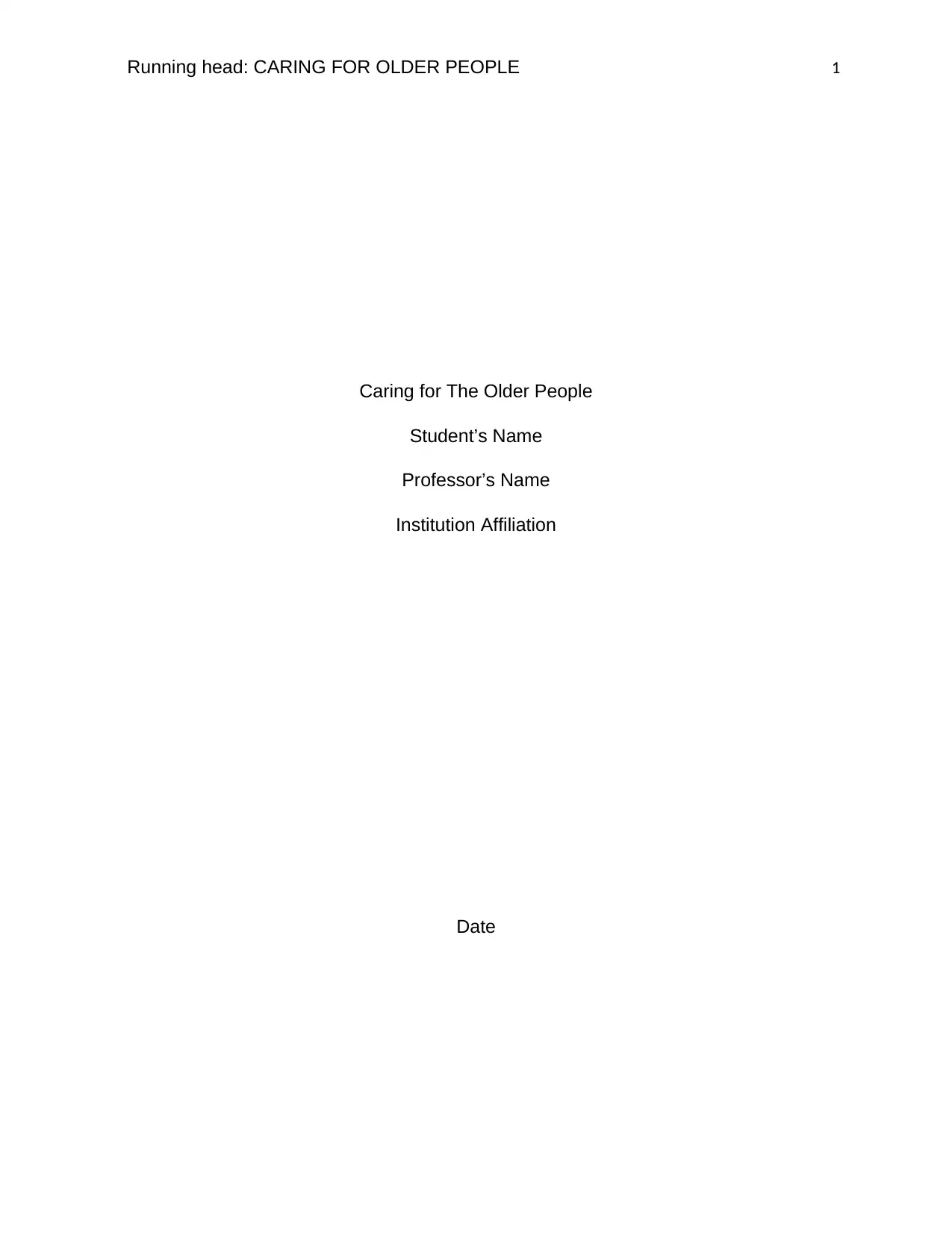
Running head: CARING FOR OLDER PEOPLE 1
Caring for The Older People
Student’s Name
Professor’s Name
Institution Affiliation
Date
Caring for The Older People
Student’s Name
Professor’s Name
Institution Affiliation
Date
Paraphrase This Document
Need a fresh take? Get an instant paraphrase of this document with our AI Paraphraser
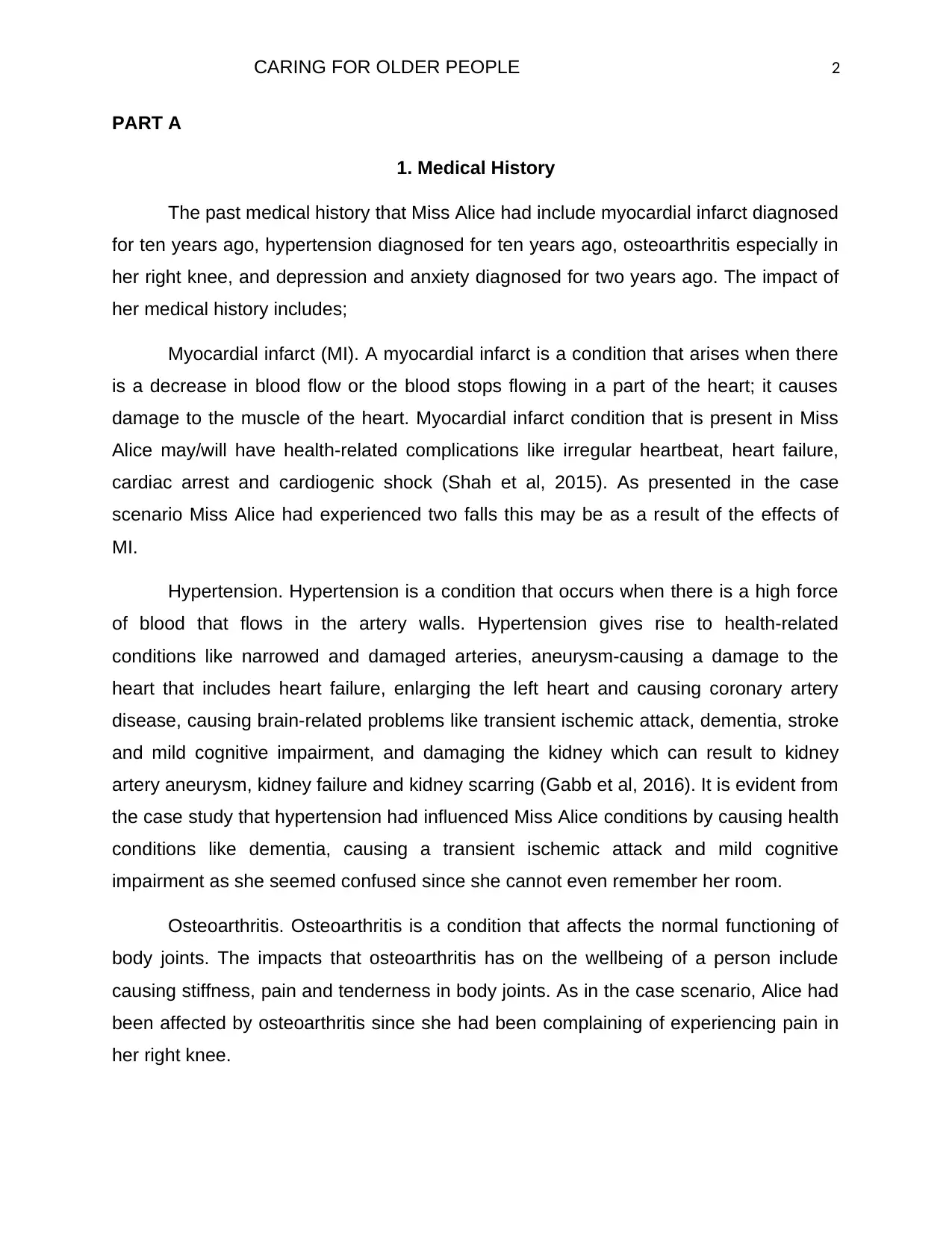
CARING FOR OLDER PEOPLE 2
PART A
1. Medical History
The past medical history that Miss Alice had include myocardial infarct diagnosed
for ten years ago, hypertension diagnosed for ten years ago, osteoarthritis especially in
her right knee, and depression and anxiety diagnosed for two years ago. The impact of
her medical history includes;
Myocardial infarct (MI). A myocardial infarct is a condition that arises when there
is a decrease in blood flow or the blood stops flowing in a part of the heart; it causes
damage to the muscle of the heart. Myocardial infarct condition that is present in Miss
Alice may/will have health-related complications like irregular heartbeat, heart failure,
cardiac arrest and cardiogenic shock (Shah et al, 2015). As presented in the case
scenario Miss Alice had experienced two falls this may be as a result of the effects of
MI.
Hypertension. Hypertension is a condition that occurs when there is a high force
of blood that flows in the artery walls. Hypertension gives rise to health-related
conditions like narrowed and damaged arteries, aneurysm-causing a damage to the
heart that includes heart failure, enlarging the left heart and causing coronary artery
disease, causing brain-related problems like transient ischemic attack, dementia, stroke
and mild cognitive impairment, and damaging the kidney which can result to kidney
artery aneurysm, kidney failure and kidney scarring (Gabb et al, 2016). It is evident from
the case study that hypertension had influenced Miss Alice conditions by causing health
conditions like dementia, causing a transient ischemic attack and mild cognitive
impairment as she seemed confused since she cannot even remember her room.
Osteoarthritis. Osteoarthritis is a condition that affects the normal functioning of
body joints. The impacts that osteoarthritis has on the wellbeing of a person include
causing stiffness, pain and tenderness in body joints. As in the case scenario, Alice had
been affected by osteoarthritis since she had been complaining of experiencing pain in
her right knee.
PART A
1. Medical History
The past medical history that Miss Alice had include myocardial infarct diagnosed
for ten years ago, hypertension diagnosed for ten years ago, osteoarthritis especially in
her right knee, and depression and anxiety diagnosed for two years ago. The impact of
her medical history includes;
Myocardial infarct (MI). A myocardial infarct is a condition that arises when there
is a decrease in blood flow or the blood stops flowing in a part of the heart; it causes
damage to the muscle of the heart. Myocardial infarct condition that is present in Miss
Alice may/will have health-related complications like irregular heartbeat, heart failure,
cardiac arrest and cardiogenic shock (Shah et al, 2015). As presented in the case
scenario Miss Alice had experienced two falls this may be as a result of the effects of
MI.
Hypertension. Hypertension is a condition that occurs when there is a high force
of blood that flows in the artery walls. Hypertension gives rise to health-related
conditions like narrowed and damaged arteries, aneurysm-causing a damage to the
heart that includes heart failure, enlarging the left heart and causing coronary artery
disease, causing brain-related problems like transient ischemic attack, dementia, stroke
and mild cognitive impairment, and damaging the kidney which can result to kidney
artery aneurysm, kidney failure and kidney scarring (Gabb et al, 2016). It is evident from
the case study that hypertension had influenced Miss Alice conditions by causing health
conditions like dementia, causing a transient ischemic attack and mild cognitive
impairment as she seemed confused since she cannot even remember her room.
Osteoarthritis. Osteoarthritis is a condition that affects the normal functioning of
body joints. The impacts that osteoarthritis has on the wellbeing of a person include
causing stiffness, pain and tenderness in body joints. As in the case scenario, Alice had
been affected by osteoarthritis since she had been complaining of experiencing pain in
her right knee.
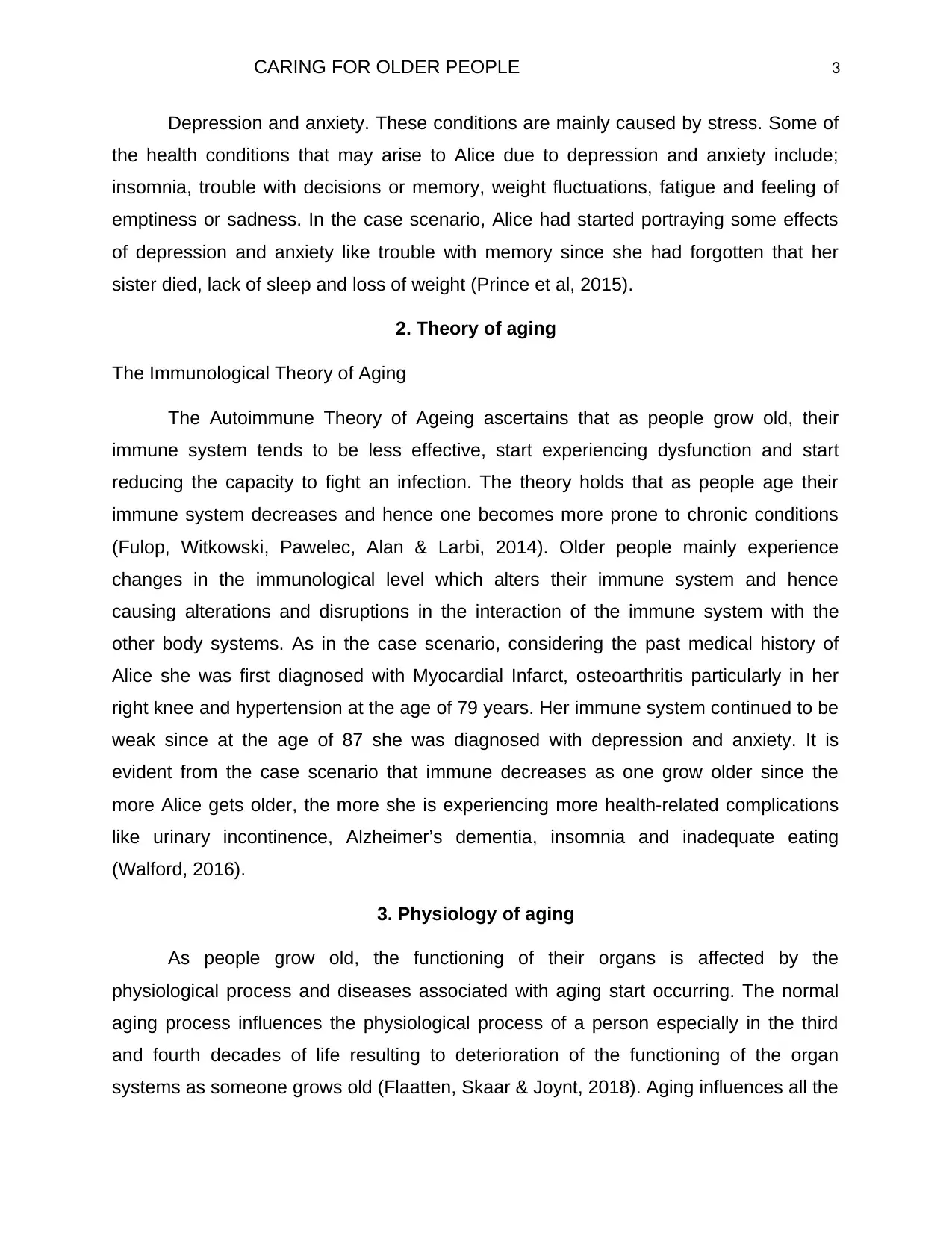
CARING FOR OLDER PEOPLE 3
Depression and anxiety. These conditions are mainly caused by stress. Some of
the health conditions that may arise to Alice due to depression and anxiety include;
insomnia, trouble with decisions or memory, weight fluctuations, fatigue and feeling of
emptiness or sadness. In the case scenario, Alice had started portraying some effects
of depression and anxiety like trouble with memory since she had forgotten that her
sister died, lack of sleep and loss of weight (Prince et al, 2015).
2. Theory of aging
The Immunological Theory of Aging
The Autoimmune Theory of Ageing ascertains that as people grow old, their
immune system tends to be less effective, start experiencing dysfunction and start
reducing the capacity to fight an infection. The theory holds that as people age their
immune system decreases and hence one becomes more prone to chronic conditions
(Fulop, Witkowski, Pawelec, Alan & Larbi, 2014). Older people mainly experience
changes in the immunological level which alters their immune system and hence
causing alterations and disruptions in the interaction of the immune system with the
other body systems. As in the case scenario, considering the past medical history of
Alice she was first diagnosed with Myocardial Infarct, osteoarthritis particularly in her
right knee and hypertension at the age of 79 years. Her immune system continued to be
weak since at the age of 87 she was diagnosed with depression and anxiety. It is
evident from the case scenario that immune decreases as one grow older since the
more Alice gets older, the more she is experiencing more health-related complications
like urinary incontinence, Alzheimer’s dementia, insomnia and inadequate eating
(Walford, 2016).
3. Physiology of aging
As people grow old, the functioning of their organs is affected by the
physiological process and diseases associated with aging start occurring. The normal
aging process influences the physiological process of a person especially in the third
and fourth decades of life resulting to deterioration of the functioning of the organ
systems as someone grows old (Flaatten, Skaar & Joynt, 2018). Aging influences all the
Depression and anxiety. These conditions are mainly caused by stress. Some of
the health conditions that may arise to Alice due to depression and anxiety include;
insomnia, trouble with decisions or memory, weight fluctuations, fatigue and feeling of
emptiness or sadness. In the case scenario, Alice had started portraying some effects
of depression and anxiety like trouble with memory since she had forgotten that her
sister died, lack of sleep and loss of weight (Prince et al, 2015).
2. Theory of aging
The Immunological Theory of Aging
The Autoimmune Theory of Ageing ascertains that as people grow old, their
immune system tends to be less effective, start experiencing dysfunction and start
reducing the capacity to fight an infection. The theory holds that as people age their
immune system decreases and hence one becomes more prone to chronic conditions
(Fulop, Witkowski, Pawelec, Alan & Larbi, 2014). Older people mainly experience
changes in the immunological level which alters their immune system and hence
causing alterations and disruptions in the interaction of the immune system with the
other body systems. As in the case scenario, considering the past medical history of
Alice she was first diagnosed with Myocardial Infarct, osteoarthritis particularly in her
right knee and hypertension at the age of 79 years. Her immune system continued to be
weak since at the age of 87 she was diagnosed with depression and anxiety. It is
evident from the case scenario that immune decreases as one grow older since the
more Alice gets older, the more she is experiencing more health-related complications
like urinary incontinence, Alzheimer’s dementia, insomnia and inadequate eating
(Walford, 2016).
3. Physiology of aging
As people grow old, the functioning of their organs is affected by the
physiological process and diseases associated with aging start occurring. The normal
aging process influences the physiological process of a person especially in the third
and fourth decades of life resulting to deterioration of the functioning of the organ
systems as someone grows old (Flaatten, Skaar & Joynt, 2018). Aging influences all the
⊘ This is a preview!⊘
Do you want full access?
Subscribe today to unlock all pages.

Trusted by 1+ million students worldwide
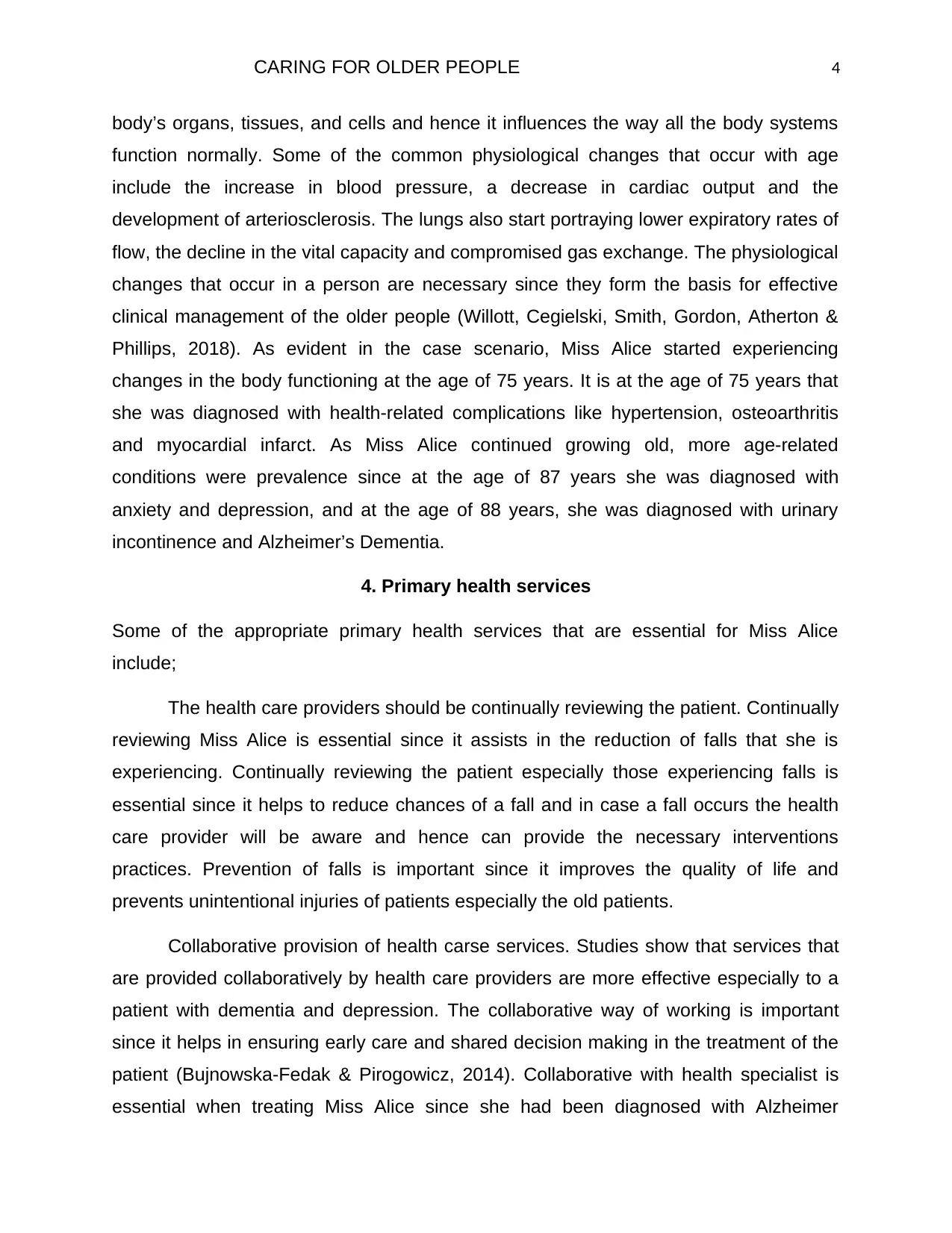
CARING FOR OLDER PEOPLE 4
body’s organs, tissues, and cells and hence it influences the way all the body systems
function normally. Some of the common physiological changes that occur with age
include the increase in blood pressure, a decrease in cardiac output and the
development of arteriosclerosis. The lungs also start portraying lower expiratory rates of
flow, the decline in the vital capacity and compromised gas exchange. The physiological
changes that occur in a person are necessary since they form the basis for effective
clinical management of the older people (Willott, Cegielski, Smith, Gordon, Atherton &
Phillips, 2018). As evident in the case scenario, Miss Alice started experiencing
changes in the body functioning at the age of 75 years. It is at the age of 75 years that
she was diagnosed with health-related complications like hypertension, osteoarthritis
and myocardial infarct. As Miss Alice continued growing old, more age-related
conditions were prevalence since at the age of 87 years she was diagnosed with
anxiety and depression, and at the age of 88 years, she was diagnosed with urinary
incontinence and Alzheimer’s Dementia.
4. Primary health services
Some of the appropriate primary health services that are essential for Miss Alice
include;
The health care providers should be continually reviewing the patient. Continually
reviewing Miss Alice is essential since it assists in the reduction of falls that she is
experiencing. Continually reviewing the patient especially those experiencing falls is
essential since it helps to reduce chances of a fall and in case a fall occurs the health
care provider will be aware and hence can provide the necessary interventions
practices. Prevention of falls is important since it improves the quality of life and
prevents unintentional injuries of patients especially the old patients.
Collaborative provision of health carse services. Studies show that services that
are provided collaboratively by health care providers are more effective especially to a
patient with dementia and depression. The collaborative way of working is important
since it helps in ensuring early care and shared decision making in the treatment of the
patient (Bujnowska-Fedak & Pirogowicz, 2014). Collaborative with health specialist is
essential when treating Miss Alice since she had been diagnosed with Alzheimer
body’s organs, tissues, and cells and hence it influences the way all the body systems
function normally. Some of the common physiological changes that occur with age
include the increase in blood pressure, a decrease in cardiac output and the
development of arteriosclerosis. The lungs also start portraying lower expiratory rates of
flow, the decline in the vital capacity and compromised gas exchange. The physiological
changes that occur in a person are necessary since they form the basis for effective
clinical management of the older people (Willott, Cegielski, Smith, Gordon, Atherton &
Phillips, 2018). As evident in the case scenario, Miss Alice started experiencing
changes in the body functioning at the age of 75 years. It is at the age of 75 years that
she was diagnosed with health-related complications like hypertension, osteoarthritis
and myocardial infarct. As Miss Alice continued growing old, more age-related
conditions were prevalence since at the age of 87 years she was diagnosed with
anxiety and depression, and at the age of 88 years, she was diagnosed with urinary
incontinence and Alzheimer’s Dementia.
4. Primary health services
Some of the appropriate primary health services that are essential for Miss Alice
include;
The health care providers should be continually reviewing the patient. Continually
reviewing Miss Alice is essential since it assists in the reduction of falls that she is
experiencing. Continually reviewing the patient especially those experiencing falls is
essential since it helps to reduce chances of a fall and in case a fall occurs the health
care provider will be aware and hence can provide the necessary interventions
practices. Prevention of falls is important since it improves the quality of life and
prevents unintentional injuries of patients especially the old patients.
Collaborative provision of health carse services. Studies show that services that
are provided collaboratively by health care providers are more effective especially to a
patient with dementia and depression. The collaborative way of working is important
since it helps in ensuring early care and shared decision making in the treatment of the
patient (Bujnowska-Fedak & Pirogowicz, 2014). Collaborative with health specialist is
essential when treating Miss Alice since she had been diagnosed with Alzheimer
Paraphrase This Document
Need a fresh take? Get an instant paraphrase of this document with our AI Paraphraser
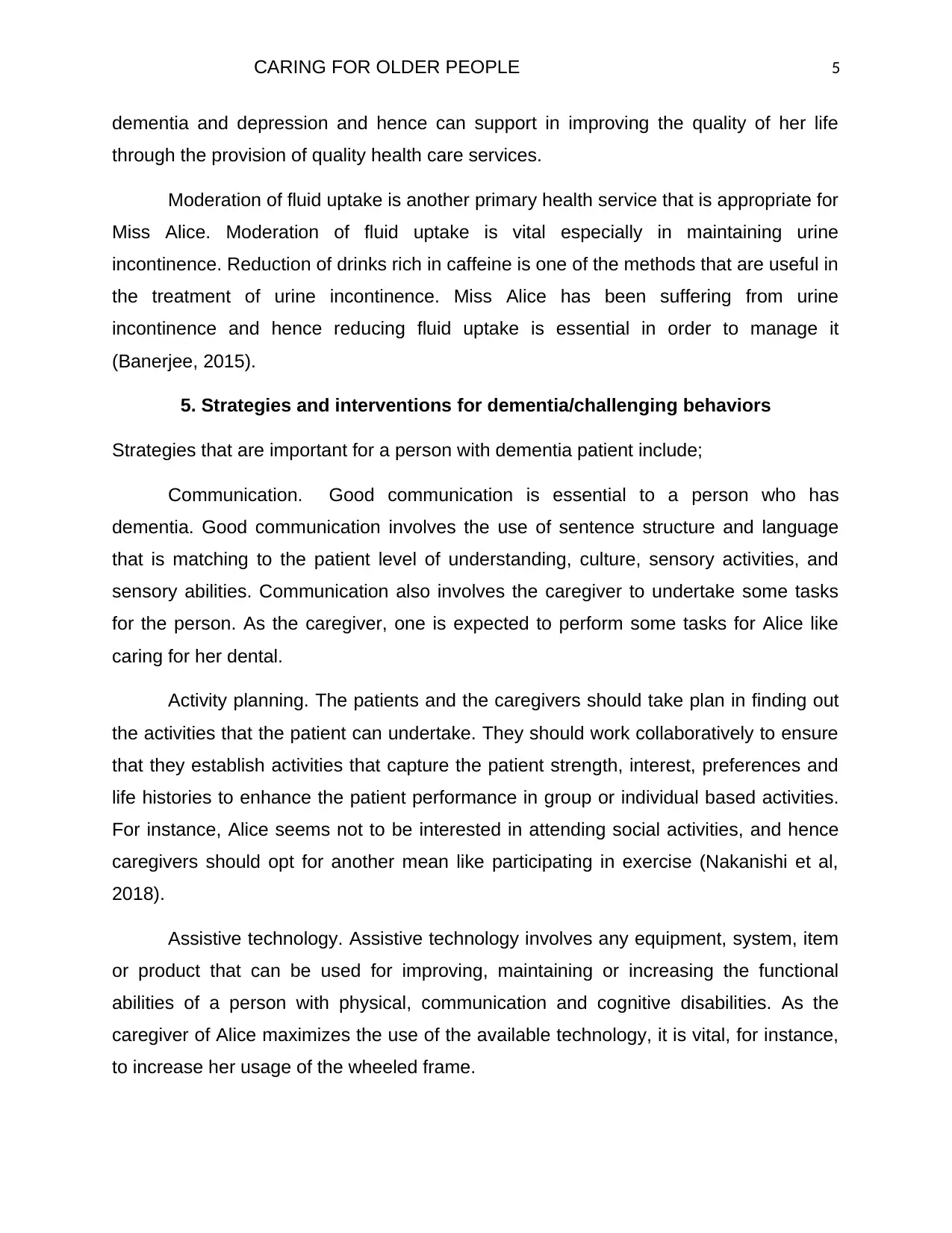
CARING FOR OLDER PEOPLE 5
dementia and depression and hence can support in improving the quality of her life
through the provision of quality health care services.
Moderation of fluid uptake is another primary health service that is appropriate for
Miss Alice. Moderation of fluid uptake is vital especially in maintaining urine
incontinence. Reduction of drinks rich in caffeine is one of the methods that are useful in
the treatment of urine incontinence. Miss Alice has been suffering from urine
incontinence and hence reducing fluid uptake is essential in order to manage it
(Banerjee, 2015).
5. Strategies and interventions for dementia/challenging behaviors
Strategies that are important for a person with dementia patient include;
Communication. Good communication is essential to a person who has
dementia. Good communication involves the use of sentence structure and language
that is matching to the patient level of understanding, culture, sensory activities, and
sensory abilities. Communication also involves the caregiver to undertake some tasks
for the person. As the caregiver, one is expected to perform some tasks for Alice like
caring for her dental.
Activity planning. The patients and the caregivers should take plan in finding out
the activities that the patient can undertake. They should work collaboratively to ensure
that they establish activities that capture the patient strength, interest, preferences and
life histories to enhance the patient performance in group or individual based activities.
For instance, Alice seems not to be interested in attending social activities, and hence
caregivers should opt for another mean like participating in exercise (Nakanishi et al,
2018).
Assistive technology. Assistive technology involves any equipment, system, item
or product that can be used for improving, maintaining or increasing the functional
abilities of a person with physical, communication and cognitive disabilities. As the
caregiver of Alice maximizes the use of the available technology, it is vital, for instance,
to increase her usage of the wheeled frame.
dementia and depression and hence can support in improving the quality of her life
through the provision of quality health care services.
Moderation of fluid uptake is another primary health service that is appropriate for
Miss Alice. Moderation of fluid uptake is vital especially in maintaining urine
incontinence. Reduction of drinks rich in caffeine is one of the methods that are useful in
the treatment of urine incontinence. Miss Alice has been suffering from urine
incontinence and hence reducing fluid uptake is essential in order to manage it
(Banerjee, 2015).
5. Strategies and interventions for dementia/challenging behaviors
Strategies that are important for a person with dementia patient include;
Communication. Good communication is essential to a person who has
dementia. Good communication involves the use of sentence structure and language
that is matching to the patient level of understanding, culture, sensory activities, and
sensory abilities. Communication also involves the caregiver to undertake some tasks
for the person. As the caregiver, one is expected to perform some tasks for Alice like
caring for her dental.
Activity planning. The patients and the caregivers should take plan in finding out
the activities that the patient can undertake. They should work collaboratively to ensure
that they establish activities that capture the patient strength, interest, preferences and
life histories to enhance the patient performance in group or individual based activities.
For instance, Alice seems not to be interested in attending social activities, and hence
caregivers should opt for another mean like participating in exercise (Nakanishi et al,
2018).
Assistive technology. Assistive technology involves any equipment, system, item
or product that can be used for improving, maintaining or increasing the functional
abilities of a person with physical, communication and cognitive disabilities. As the
caregiver of Alice maximizes the use of the available technology, it is vital, for instance,
to increase her usage of the wheeled frame.
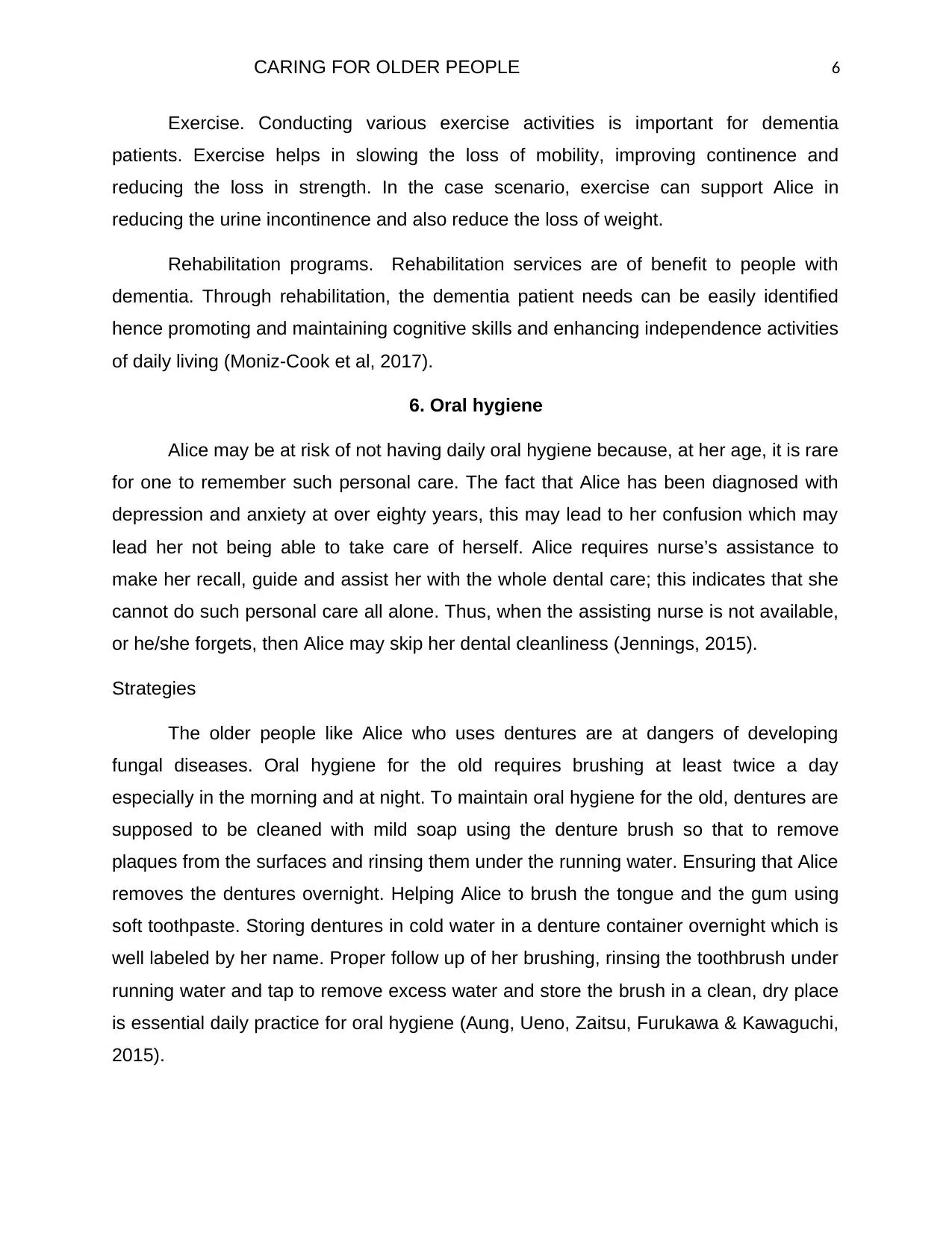
CARING FOR OLDER PEOPLE 6
Exercise. Conducting various exercise activities is important for dementia
patients. Exercise helps in slowing the loss of mobility, improving continence and
reducing the loss in strength. In the case scenario, exercise can support Alice in
reducing the urine incontinence and also reduce the loss of weight.
Rehabilitation programs. Rehabilitation services are of benefit to people with
dementia. Through rehabilitation, the dementia patient needs can be easily identified
hence promoting and maintaining cognitive skills and enhancing independence activities
of daily living (Moniz-Cook et al, 2017).
6. Oral hygiene
Alice may be at risk of not having daily oral hygiene because, at her age, it is rare
for one to remember such personal care. The fact that Alice has been diagnosed with
depression and anxiety at over eighty years, this may lead to her confusion which may
lead her not being able to take care of herself. Alice requires nurse’s assistance to
make her recall, guide and assist her with the whole dental care; this indicates that she
cannot do such personal care all alone. Thus, when the assisting nurse is not available,
or he/she forgets, then Alice may skip her dental cleanliness (Jennings, 2015).
Strategies
The older people like Alice who uses dentures are at dangers of developing
fungal diseases. Oral hygiene for the old requires brushing at least twice a day
especially in the morning and at night. To maintain oral hygiene for the old, dentures are
supposed to be cleaned with mild soap using the denture brush so that to remove
plaques from the surfaces and rinsing them under the running water. Ensuring that Alice
removes the dentures overnight. Helping Alice to brush the tongue and the gum using
soft toothpaste. Storing dentures in cold water in a denture container overnight which is
well labeled by her name. Proper follow up of her brushing, rinsing the toothbrush under
running water and tap to remove excess water and store the brush in a clean, dry place
is essential daily practice for oral hygiene (Aung, Ueno, Zaitsu, Furukawa & Kawaguchi,
2015).
Exercise. Conducting various exercise activities is important for dementia
patients. Exercise helps in slowing the loss of mobility, improving continence and
reducing the loss in strength. In the case scenario, exercise can support Alice in
reducing the urine incontinence and also reduce the loss of weight.
Rehabilitation programs. Rehabilitation services are of benefit to people with
dementia. Through rehabilitation, the dementia patient needs can be easily identified
hence promoting and maintaining cognitive skills and enhancing independence activities
of daily living (Moniz-Cook et al, 2017).
6. Oral hygiene
Alice may be at risk of not having daily oral hygiene because, at her age, it is rare
for one to remember such personal care. The fact that Alice has been diagnosed with
depression and anxiety at over eighty years, this may lead to her confusion which may
lead her not being able to take care of herself. Alice requires nurse’s assistance to
make her recall, guide and assist her with the whole dental care; this indicates that she
cannot do such personal care all alone. Thus, when the assisting nurse is not available,
or he/she forgets, then Alice may skip her dental cleanliness (Jennings, 2015).
Strategies
The older people like Alice who uses dentures are at dangers of developing
fungal diseases. Oral hygiene for the old requires brushing at least twice a day
especially in the morning and at night. To maintain oral hygiene for the old, dentures are
supposed to be cleaned with mild soap using the denture brush so that to remove
plaques from the surfaces and rinsing them under the running water. Ensuring that Alice
removes the dentures overnight. Helping Alice to brush the tongue and the gum using
soft toothpaste. Storing dentures in cold water in a denture container overnight which is
well labeled by her name. Proper follow up of her brushing, rinsing the toothbrush under
running water and tap to remove excess water and store the brush in a clean, dry place
is essential daily practice for oral hygiene (Aung, Ueno, Zaitsu, Furukawa & Kawaguchi,
2015).
⊘ This is a preview!⊘
Do you want full access?
Subscribe today to unlock all pages.

Trusted by 1+ million students worldwide
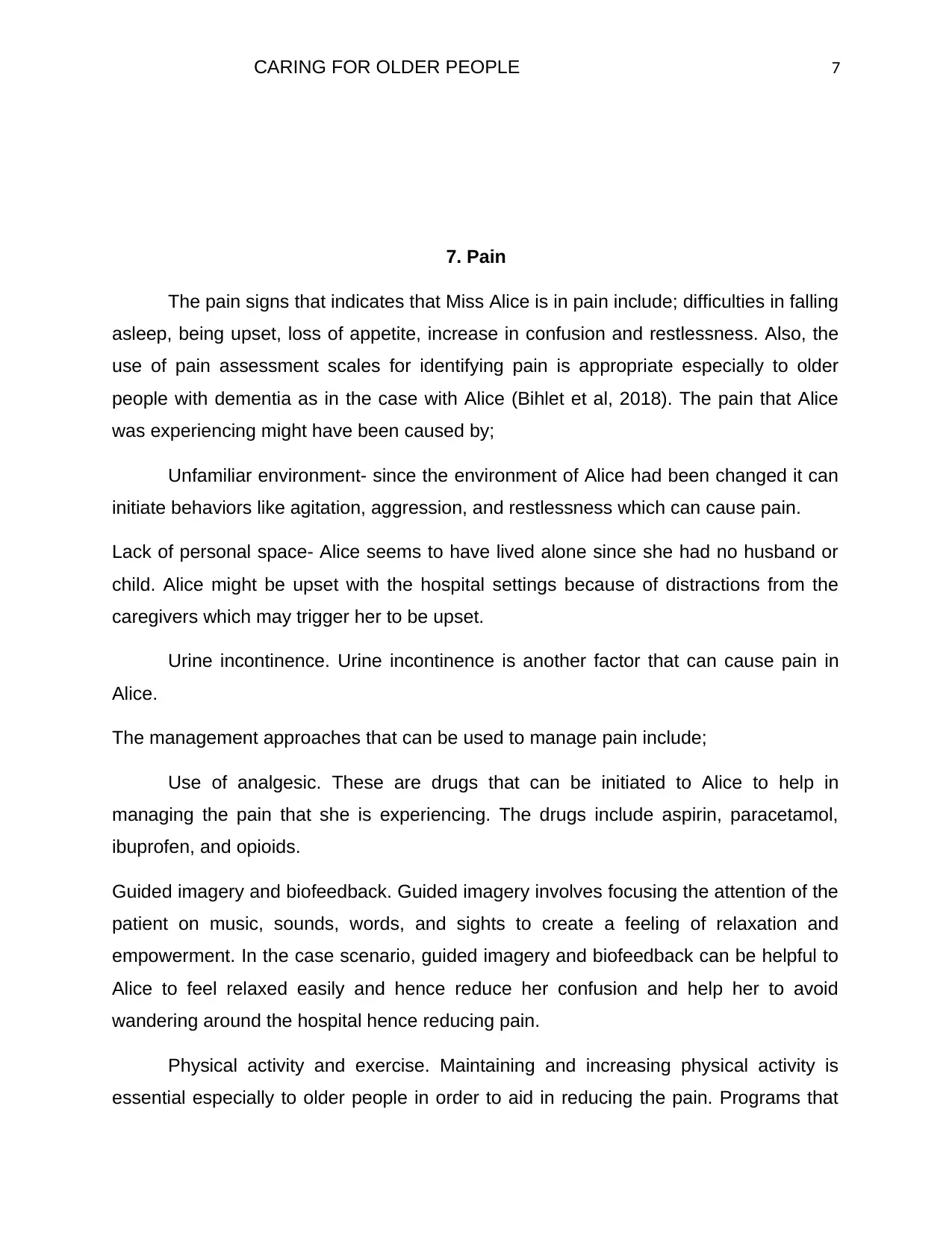
CARING FOR OLDER PEOPLE 7
7. Pain
The pain signs that indicates that Miss Alice is in pain include; difficulties in falling
asleep, being upset, loss of appetite, increase in confusion and restlessness. Also, the
use of pain assessment scales for identifying pain is appropriate especially to older
people with dementia as in the case with Alice (Bihlet et al, 2018). The pain that Alice
was experiencing might have been caused by;
Unfamiliar environment- since the environment of Alice had been changed it can
initiate behaviors like agitation, aggression, and restlessness which can cause pain.
Lack of personal space- Alice seems to have lived alone since she had no husband or
child. Alice might be upset with the hospital settings because of distractions from the
caregivers which may trigger her to be upset.
Urine incontinence. Urine incontinence is another factor that can cause pain in
Alice.
The management approaches that can be used to manage pain include;
Use of analgesic. These are drugs that can be initiated to Alice to help in
managing the pain that she is experiencing. The drugs include aspirin, paracetamol,
ibuprofen, and opioids.
Guided imagery and biofeedback. Guided imagery involves focusing the attention of the
patient on music, sounds, words, and sights to create a feeling of relaxation and
empowerment. In the case scenario, guided imagery and biofeedback can be helpful to
Alice to feel relaxed easily and hence reduce her confusion and help her to avoid
wandering around the hospital hence reducing pain.
Physical activity and exercise. Maintaining and increasing physical activity is
essential especially to older people in order to aid in reducing the pain. Programs that
7. Pain
The pain signs that indicates that Miss Alice is in pain include; difficulties in falling
asleep, being upset, loss of appetite, increase in confusion and restlessness. Also, the
use of pain assessment scales for identifying pain is appropriate especially to older
people with dementia as in the case with Alice (Bihlet et al, 2018). The pain that Alice
was experiencing might have been caused by;
Unfamiliar environment- since the environment of Alice had been changed it can
initiate behaviors like agitation, aggression, and restlessness which can cause pain.
Lack of personal space- Alice seems to have lived alone since she had no husband or
child. Alice might be upset with the hospital settings because of distractions from the
caregivers which may trigger her to be upset.
Urine incontinence. Urine incontinence is another factor that can cause pain in
Alice.
The management approaches that can be used to manage pain include;
Use of analgesic. These are drugs that can be initiated to Alice to help in
managing the pain that she is experiencing. The drugs include aspirin, paracetamol,
ibuprofen, and opioids.
Guided imagery and biofeedback. Guided imagery involves focusing the attention of the
patient on music, sounds, words, and sights to create a feeling of relaxation and
empowerment. In the case scenario, guided imagery and biofeedback can be helpful to
Alice to feel relaxed easily and hence reduce her confusion and help her to avoid
wandering around the hospital hence reducing pain.
Physical activity and exercise. Maintaining and increasing physical activity is
essential especially to older people in order to aid in reducing the pain. Programs that
Paraphrase This Document
Need a fresh take? Get an instant paraphrase of this document with our AI Paraphraser
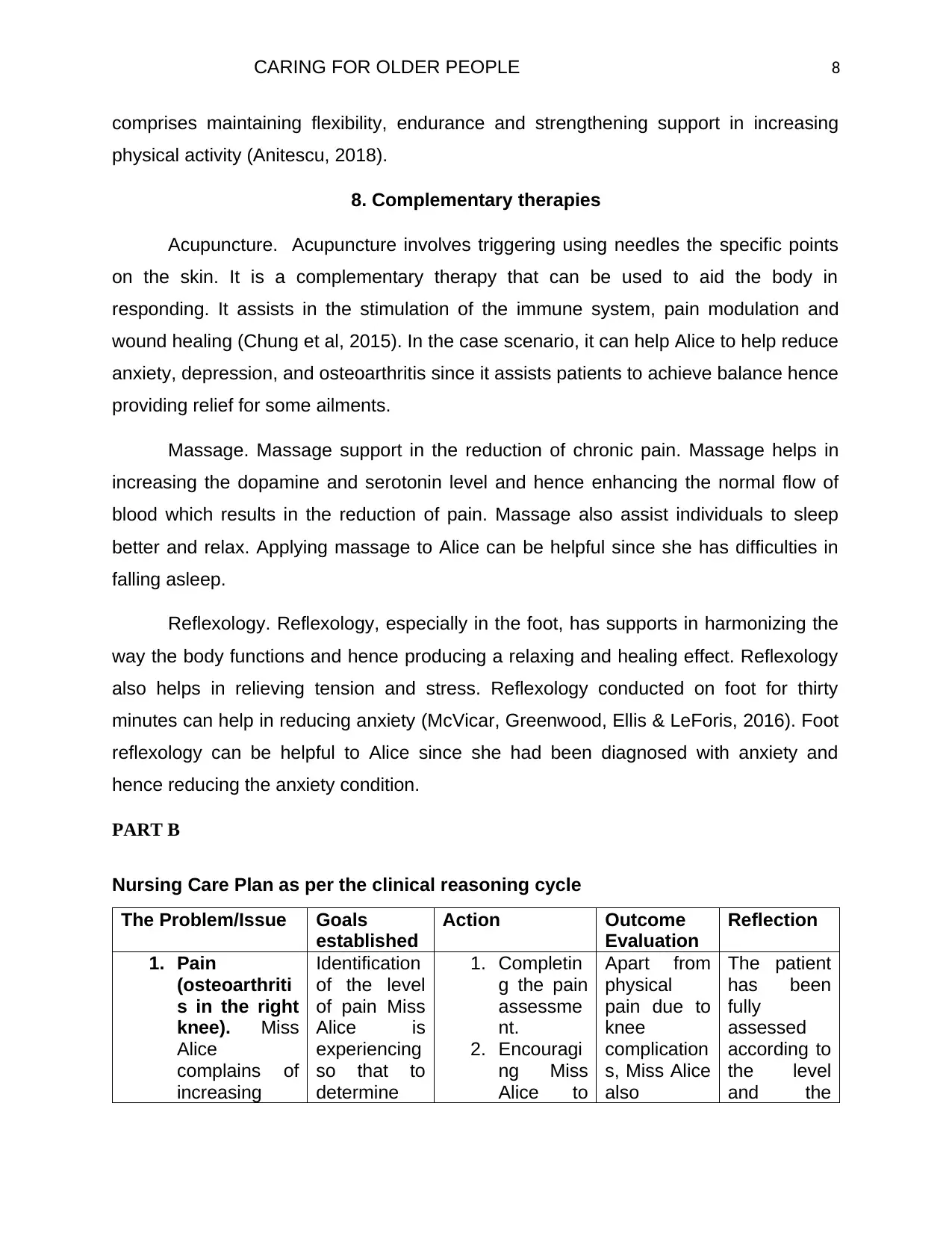
CARING FOR OLDER PEOPLE 8
comprises maintaining flexibility, endurance and strengthening support in increasing
physical activity (Anitescu, 2018).
8. Complementary therapies
Acupuncture. Acupuncture involves triggering using needles the specific points
on the skin. It is a complementary therapy that can be used to aid the body in
responding. It assists in the stimulation of the immune system, pain modulation and
wound healing (Chung et al, 2015). In the case scenario, it can help Alice to help reduce
anxiety, depression, and osteoarthritis since it assists patients to achieve balance hence
providing relief for some ailments.
Massage. Massage support in the reduction of chronic pain. Massage helps in
increasing the dopamine and serotonin level and hence enhancing the normal flow of
blood which results in the reduction of pain. Massage also assist individuals to sleep
better and relax. Applying massage to Alice can be helpful since she has difficulties in
falling asleep.
Reflexology. Reflexology, especially in the foot, has supports in harmonizing the
way the body functions and hence producing a relaxing and healing effect. Reflexology
also helps in relieving tension and stress. Reflexology conducted on foot for thirty
minutes can help in reducing anxiety (McVicar, Greenwood, Ellis & LeForis, 2016). Foot
reflexology can be helpful to Alice since she had been diagnosed with anxiety and
hence reducing the anxiety condition.
PART B
Nursing Care Plan as per the clinical reasoning cycle
The Problem/Issue Goals
established
Action Outcome
Evaluation
Reflection
1. Pain
(osteoarthriti
s in the right
knee). Miss
Alice
complains of
increasing
Identification
of the level
of pain Miss
Alice is
experiencing
so that to
determine
1. Completin
g the pain
assessme
nt.
2. Encouragi
ng Miss
Alice to
Apart from
physical
pain due to
knee
complication
s, Miss Alice
also
The patient
has been
fully
assessed
according to
the level
and the
comprises maintaining flexibility, endurance and strengthening support in increasing
physical activity (Anitescu, 2018).
8. Complementary therapies
Acupuncture. Acupuncture involves triggering using needles the specific points
on the skin. It is a complementary therapy that can be used to aid the body in
responding. It assists in the stimulation of the immune system, pain modulation and
wound healing (Chung et al, 2015). In the case scenario, it can help Alice to help reduce
anxiety, depression, and osteoarthritis since it assists patients to achieve balance hence
providing relief for some ailments.
Massage. Massage support in the reduction of chronic pain. Massage helps in
increasing the dopamine and serotonin level and hence enhancing the normal flow of
blood which results in the reduction of pain. Massage also assist individuals to sleep
better and relax. Applying massage to Alice can be helpful since she has difficulties in
falling asleep.
Reflexology. Reflexology, especially in the foot, has supports in harmonizing the
way the body functions and hence producing a relaxing and healing effect. Reflexology
also helps in relieving tension and stress. Reflexology conducted on foot for thirty
minutes can help in reducing anxiety (McVicar, Greenwood, Ellis & LeForis, 2016). Foot
reflexology can be helpful to Alice since she had been diagnosed with anxiety and
hence reducing the anxiety condition.
PART B
Nursing Care Plan as per the clinical reasoning cycle
The Problem/Issue Goals
established
Action Outcome
Evaluation
Reflection
1. Pain
(osteoarthriti
s in the right
knee). Miss
Alice
complains of
increasing
Identification
of the level
of pain Miss
Alice is
experiencing
so that to
determine
1. Completin
g the pain
assessme
nt.
2. Encouragi
ng Miss
Alice to
Apart from
physical
pain due to
knee
complication
s, Miss Alice
also
The patient
has been
fully
assessed
according to
the level
and the
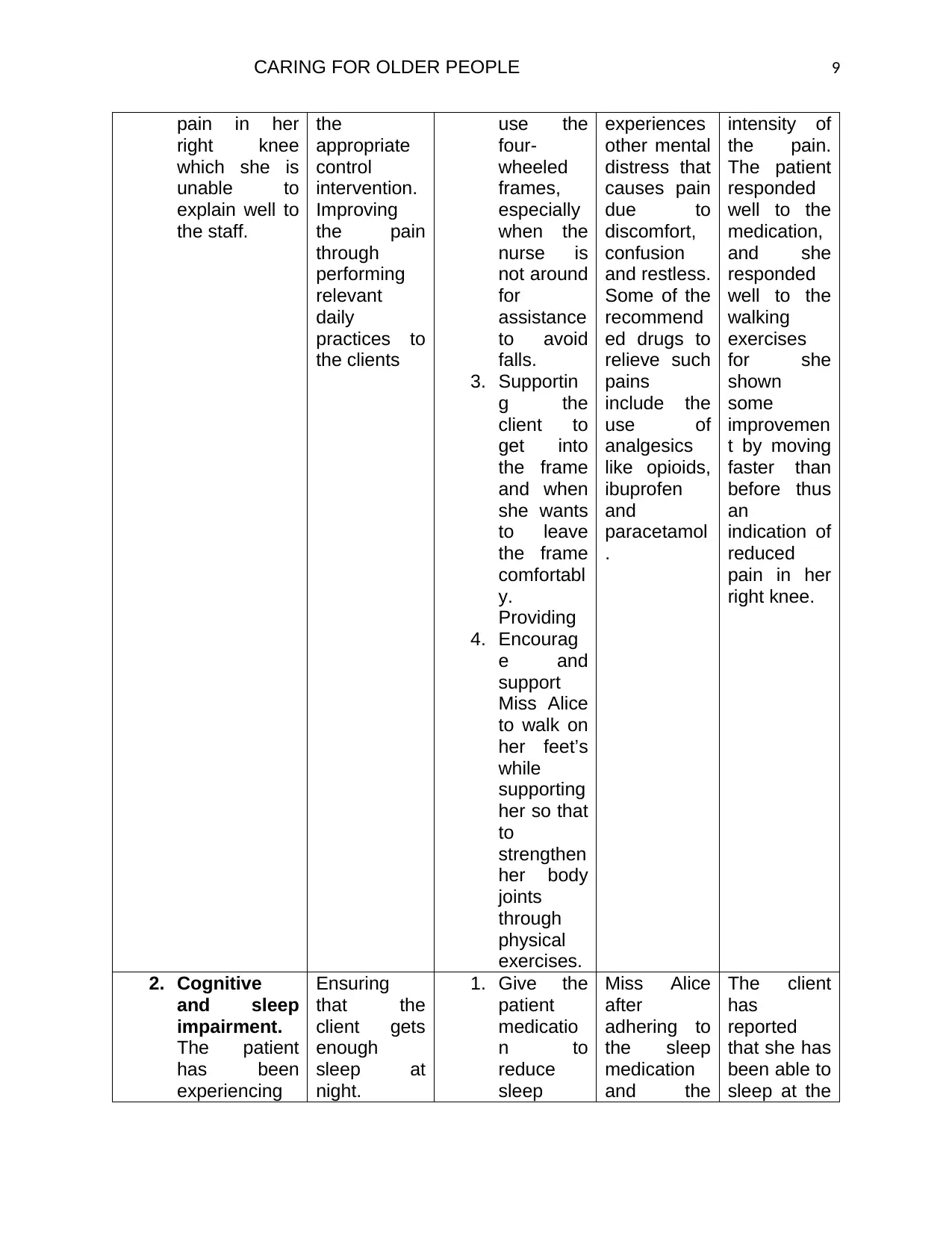
CARING FOR OLDER PEOPLE 9
pain in her
right knee
which she is
unable to
explain well to
the staff.
the
appropriate
control
intervention.
Improving
the pain
through
performing
relevant
daily
practices to
the clients
use the
four-
wheeled
frames,
especially
when the
nurse is
not around
for
assistance
to avoid
falls.
3. Supportin
g the
client to
get into
the frame
and when
she wants
to leave
the frame
comfortabl
y.
Providing
4. Encourag
e and
support
Miss Alice
to walk on
her feet’s
while
supporting
her so that
to
strengthen
her body
joints
through
physical
exercises.
experiences
other mental
distress that
causes pain
due to
discomfort,
confusion
and restless.
Some of the
recommend
ed drugs to
relieve such
pains
include the
use of
analgesics
like opioids,
ibuprofen
and
paracetamol
.
intensity of
the pain.
The patient
responded
well to the
medication,
and she
responded
well to the
walking
exercises
for she
shown
some
improvemen
t by moving
faster than
before thus
an
indication of
reduced
pain in her
right knee.
2. Cognitive
and sleep
impairment.
The patient
has been
experiencing
Ensuring
that the
client gets
enough
sleep at
night.
1. Give the
patient
medicatio
n to
reduce
sleep
Miss Alice
after
adhering to
the sleep
medication
and the
The client
has
reported
that she has
been able to
sleep at the
pain in her
right knee
which she is
unable to
explain well to
the staff.
the
appropriate
control
intervention.
Improving
the pain
through
performing
relevant
daily
practices to
the clients
use the
four-
wheeled
frames,
especially
when the
nurse is
not around
for
assistance
to avoid
falls.
3. Supportin
g the
client to
get into
the frame
and when
she wants
to leave
the frame
comfortabl
y.
Providing
4. Encourag
e and
support
Miss Alice
to walk on
her feet’s
while
supporting
her so that
to
strengthen
her body
joints
through
physical
exercises.
experiences
other mental
distress that
causes pain
due to
discomfort,
confusion
and restless.
Some of the
recommend
ed drugs to
relieve such
pains
include the
use of
analgesics
like opioids,
ibuprofen
and
paracetamol
.
intensity of
the pain.
The patient
responded
well to the
medication,
and she
responded
well to the
walking
exercises
for she
shown
some
improvemen
t by moving
faster than
before thus
an
indication of
reduced
pain in her
right knee.
2. Cognitive
and sleep
impairment.
The patient
has been
experiencing
Ensuring
that the
client gets
enough
sleep at
night.
1. Give the
patient
medicatio
n to
reduce
sleep
Miss Alice
after
adhering to
the sleep
medication
and the
The client
has
reported
that she has
been able to
sleep at the
⊘ This is a preview!⊘
Do you want full access?
Subscribe today to unlock all pages.

Trusted by 1+ million students worldwide
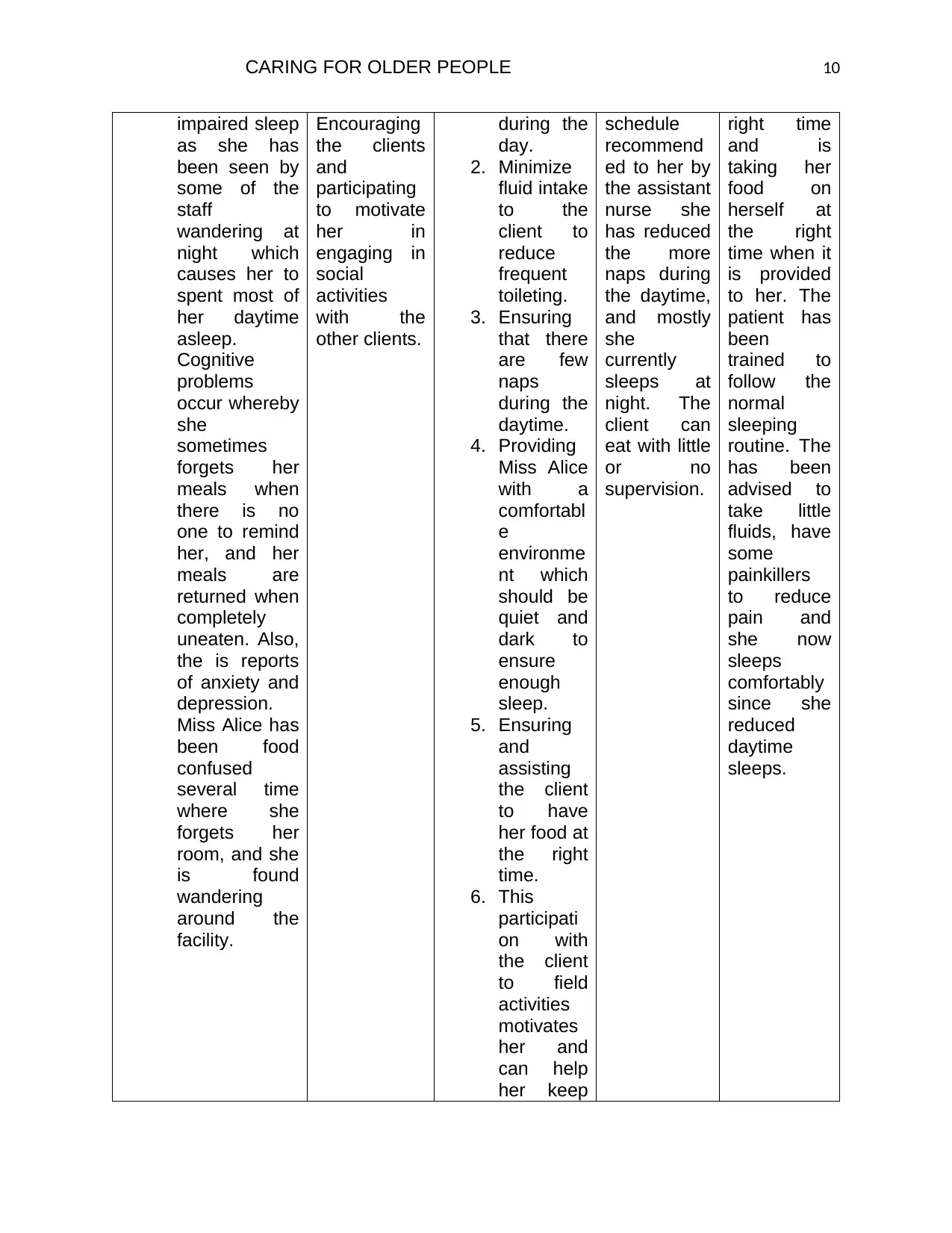
CARING FOR OLDER PEOPLE 10
impaired sleep
as she has
been seen by
some of the
staff
wandering at
night which
causes her to
spent most of
her daytime
asleep.
Cognitive
problems
occur whereby
she
sometimes
forgets her
meals when
there is no
one to remind
her, and her
meals are
returned when
completely
uneaten. Also,
the is reports
of anxiety and
depression.
Miss Alice has
been food
confused
several time
where she
forgets her
room, and she
is found
wandering
around the
facility.
Encouraging
the clients
and
participating
to motivate
her in
engaging in
social
activities
with the
other clients.
during the
day.
2. Minimize
fluid intake
to the
client to
reduce
frequent
toileting.
3. Ensuring
that there
are few
naps
during the
daytime.
4. Providing
Miss Alice
with a
comfortabl
e
environme
nt which
should be
quiet and
dark to
ensure
enough
sleep.
5. Ensuring
and
assisting
the client
to have
her food at
the right
time.
6. This
participati
on with
the client
to field
activities
motivates
her and
can help
her keep
schedule
recommend
ed to her by
the assistant
nurse she
has reduced
the more
naps during
the daytime,
and mostly
she
currently
sleeps at
night. The
client can
eat with little
or no
supervision.
right time
and is
taking her
food on
herself at
the right
time when it
is provided
to her. The
patient has
been
trained to
follow the
normal
sleeping
routine. The
has been
advised to
take little
fluids, have
some
painkillers
to reduce
pain and
she now
sleeps
comfortably
since she
reduced
daytime
sleeps.
impaired sleep
as she has
been seen by
some of the
staff
wandering at
night which
causes her to
spent most of
her daytime
asleep.
Cognitive
problems
occur whereby
she
sometimes
forgets her
meals when
there is no
one to remind
her, and her
meals are
returned when
completely
uneaten. Also,
the is reports
of anxiety and
depression.
Miss Alice has
been food
confused
several time
where she
forgets her
room, and she
is found
wandering
around the
facility.
Encouraging
the clients
and
participating
to motivate
her in
engaging in
social
activities
with the
other clients.
during the
day.
2. Minimize
fluid intake
to the
client to
reduce
frequent
toileting.
3. Ensuring
that there
are few
naps
during the
daytime.
4. Providing
Miss Alice
with a
comfortabl
e
environme
nt which
should be
quiet and
dark to
ensure
enough
sleep.
5. Ensuring
and
assisting
the client
to have
her food at
the right
time.
6. This
participati
on with
the client
to field
activities
motivates
her and
can help
her keep
schedule
recommend
ed to her by
the assistant
nurse she
has reduced
the more
naps during
the daytime,
and mostly
she
currently
sleeps at
night. The
client can
eat with little
or no
supervision.
right time
and is
taking her
food on
herself at
the right
time when it
is provided
to her. The
patient has
been
trained to
follow the
normal
sleeping
routine. The
has been
advised to
take little
fluids, have
some
painkillers
to reduce
pain and
she now
sleeps
comfortably
since she
reduced
daytime
sleeps.
Paraphrase This Document
Need a fresh take? Get an instant paraphrase of this document with our AI Paraphraser
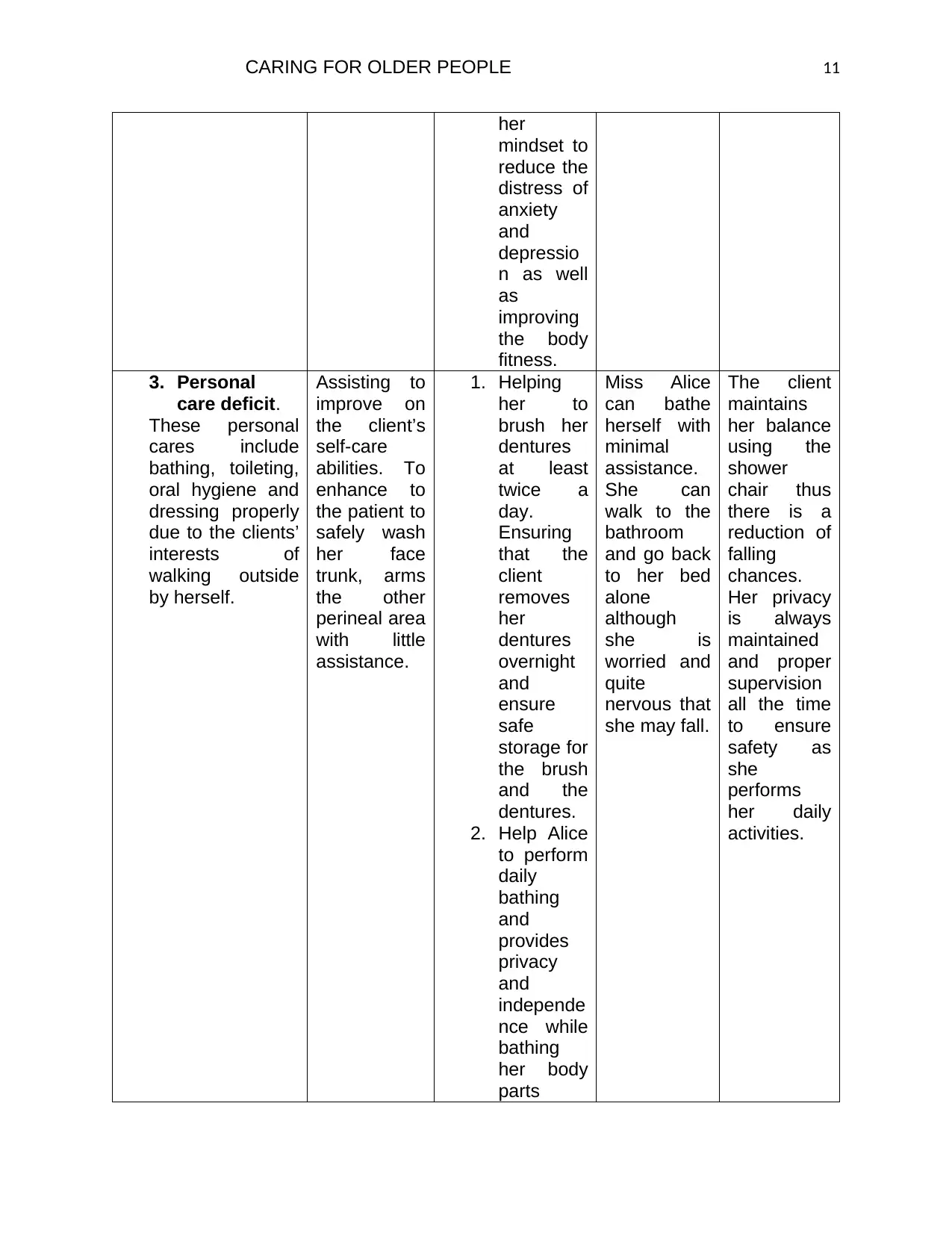
CARING FOR OLDER PEOPLE 11
her
mindset to
reduce the
distress of
anxiety
and
depressio
n as well
as
improving
the body
fitness.
3. Personal
care deficit.
These personal
cares include
bathing, toileting,
oral hygiene and
dressing properly
due to the clients’
interests of
walking outside
by herself.
Assisting to
improve on
the client’s
self-care
abilities. To
enhance to
the patient to
safely wash
her face
trunk, arms
the other
perineal area
with little
assistance.
1. Helping
her to
brush her
dentures
at least
twice a
day.
Ensuring
that the
client
removes
her
dentures
overnight
and
ensure
safe
storage for
the brush
and the
dentures.
2. Help Alice
to perform
daily
bathing
and
provides
privacy
and
independe
nce while
bathing
her body
parts
Miss Alice
can bathe
herself with
minimal
assistance.
She can
walk to the
bathroom
and go back
to her bed
alone
although
she is
worried and
quite
nervous that
she may fall.
The client
maintains
her balance
using the
shower
chair thus
there is a
reduction of
falling
chances.
Her privacy
is always
maintained
and proper
supervision
all the time
to ensure
safety as
she
performs
her daily
activities.
her
mindset to
reduce the
distress of
anxiety
and
depressio
n as well
as
improving
the body
fitness.
3. Personal
care deficit.
These personal
cares include
bathing, toileting,
oral hygiene and
dressing properly
due to the clients’
interests of
walking outside
by herself.
Assisting to
improve on
the client’s
self-care
abilities. To
enhance to
the patient to
safely wash
her face
trunk, arms
the other
perineal area
with little
assistance.
1. Helping
her to
brush her
dentures
at least
twice a
day.
Ensuring
that the
client
removes
her
dentures
overnight
and
ensure
safe
storage for
the brush
and the
dentures.
2. Help Alice
to perform
daily
bathing
and
provides
privacy
and
independe
nce while
bathing
her body
parts
Miss Alice
can bathe
herself with
minimal
assistance.
She can
walk to the
bathroom
and go back
to her bed
alone
although
she is
worried and
quite
nervous that
she may fall.
The client
maintains
her balance
using the
shower
chair thus
there is a
reduction of
falling
chances.
Her privacy
is always
maintained
and proper
supervision
all the time
to ensure
safety as
she
performs
her daily
activities.
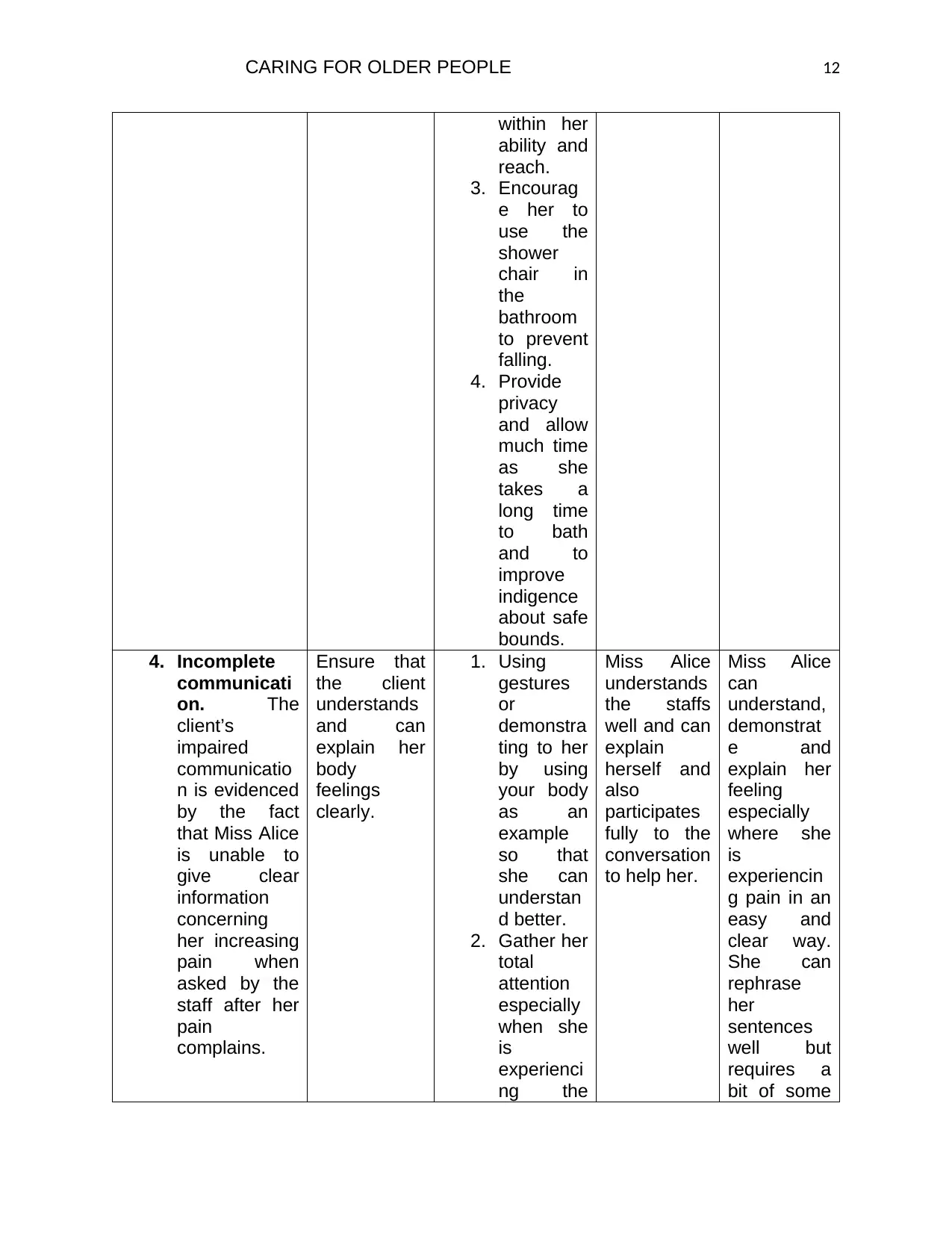
CARING FOR OLDER PEOPLE 12
within her
ability and
reach.
3. Encourag
e her to
use the
shower
chair in
the
bathroom
to prevent
falling.
4. Provide
privacy
and allow
much time
as she
takes a
long time
to bath
and to
improve
indigence
about safe
bounds.
4. Incomplete
communicati
on. The
client’s
impaired
communicatio
n is evidenced
by the fact
that Miss Alice
is unable to
give clear
information
concerning
her increasing
pain when
asked by the
staff after her
pain
complains.
Ensure that
the client
understands
and can
explain her
body
feelings
clearly.
1. Using
gestures
or
demonstra
ting to her
by using
your body
as an
example
so that
she can
understan
d better.
2. Gather her
total
attention
especially
when she
is
experienci
ng the
Miss Alice
understands
the staffs
well and can
explain
herself and
also
participates
fully to the
conversation
to help her.
Miss Alice
can
understand,
demonstrat
e and
explain her
feeling
especially
where she
is
experiencin
g pain in an
easy and
clear way.
She can
rephrase
her
sentences
well but
requires a
bit of some
within her
ability and
reach.
3. Encourag
e her to
use the
shower
chair in
the
bathroom
to prevent
falling.
4. Provide
privacy
and allow
much time
as she
takes a
long time
to bath
and to
improve
indigence
about safe
bounds.
4. Incomplete
communicati
on. The
client’s
impaired
communicatio
n is evidenced
by the fact
that Miss Alice
is unable to
give clear
information
concerning
her increasing
pain when
asked by the
staff after her
pain
complains.
Ensure that
the client
understands
and can
explain her
body
feelings
clearly.
1. Using
gestures
or
demonstra
ting to her
by using
your body
as an
example
so that
she can
understan
d better.
2. Gather her
total
attention
especially
when she
is
experienci
ng the
Miss Alice
understands
the staffs
well and can
explain
herself and
also
participates
fully to the
conversation
to help her.
Miss Alice
can
understand,
demonstrat
e and
explain her
feeling
especially
where she
is
experiencin
g pain in an
easy and
clear way.
She can
rephrase
her
sentences
well but
requires a
bit of some
⊘ This is a preview!⊘
Do you want full access?
Subscribe today to unlock all pages.

Trusted by 1+ million students worldwide
1 out of 16
Related Documents
Your All-in-One AI-Powered Toolkit for Academic Success.
+13062052269
info@desklib.com
Available 24*7 on WhatsApp / Email
![[object Object]](/_next/static/media/star-bottom.7253800d.svg)
Unlock your academic potential
Copyright © 2020–2026 A2Z Services. All Rights Reserved. Developed and managed by ZUCOL.





